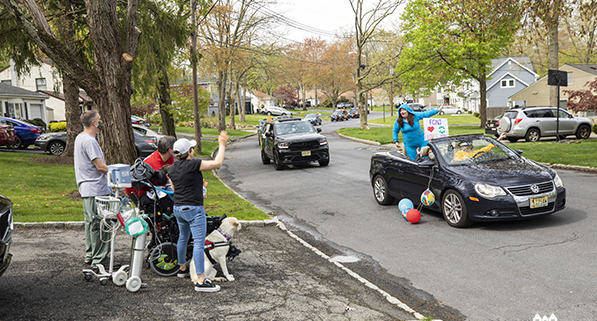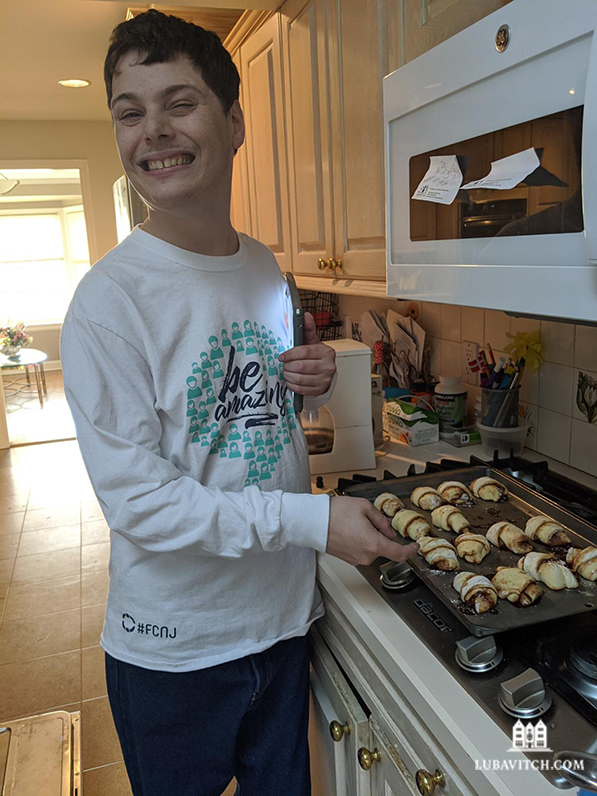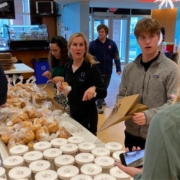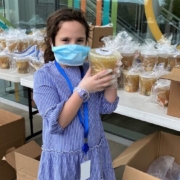Thank you to all the amazing FC Volunteers & Buddies!
Thank you to all the amazing FCNJ – Friendship Circle volunteers and buddies for keeping the FC spirit alive! Article below from Lubavitch.com.
On Sunday, May 10, Hannah Solomon, 26, waited outside her family’s home in North Caldwell, New Jersey, filled with the anticipation of seeing her friends for the first time in weeks.
The sound of blaring sirens heralded a flashing motorcade of fire trucks, ambulances, and police cars driving down her block. Friendship Circle staff members and volunteers followed in cars festooned with colorful balloons.
Curious neighbors came out to enjoy the lively spectacle, a rare and welcome sight after weeks of confinement.
The parade came by the Solomon home just for Hannah, a young woman with multiple disabilities related to her Dandy-Walker variant diagnosis. The Livingston, New Jersey chapter of Friendship Circle, a Chabad organization dedicated to serving those with special needs, arranged the event to “Just say hi!” to its members, showing support and togetherness in a time of crisis.
“At first, when she found out she couldn’t see her friends anymore, Hannah kept asking, ‘How come?’” said Lori Solomon, Hannah’s mother. “So she was so excited to finally see everyone. It made us all feel great to see the whole town rally for her. We consider Friendship Circle our extended family.”
Maintaining Connection
Social isolation is difficult for many, especially children with special needs. When Jacob, 10, found out that the shutdown meant he would not be going to Hebrew School anymore, he cried.
“He knows that Hebrew School ends in May,” his mother, Sharon, recalled, “So the news was especially devastating to him. He loves going.”
Jacob, who has autism, now attends Hebrew School virtually. Along with autism, Jacob also has ADHD, so he has difficulty being engaged and staying focused. While it’s not always easy, he participates online as much as he can. “He’s getting better at it each day,” his mother said.
On Jacob’s birthday, Friendship Circle volunteers went to his house, holding signs out their car windows and singing Happy Birthday. They also dropped off a gift.
“Interpersonal connection is so important, especially now,” said Rabbi Zalman Grossbaum of Livingston, New Jersey. “The challenge is greater for students, families, and teachers in special education. Our focus is to be there for the families; to give the children the tangible structure and consistency that is so crucial.”
Rabbi Grossbaum is seeing even more connection now that Friendship Circle’s programs are virtual. “We used to worry about how we would keep in touch with the kids once they graduated and moved on. Now, many are participating in our activities again. They are back and involved.
“In so many ways,” said Grossbaum, “being there for the children and their families is the essence of shlichus, our mission. Our mission statement is the biblical axiom of ‘Veahavta Lerayacha Kamocha’—to love your fellow as you love yourself. That is the entire Torah—the rest is in the details.”
Virtual Reality
In a time of crisis, everyone has to adapt. For those in the special education sector, this unique time calls for innovation. How does Friendship Circle continue to support the needs of the individual, a concept core to its mission—in a world where individuals must remain apart?
“As soon as we realized that we’d have to close our physical doors, we jumped into action,” recounted Mrs. Bassie Shemtov, co-founder and director of Friendship Circle. In her home state of Michigan, they had to mobilize quickly.
At their emergency brainstorm meeting, which took place before social distancing regulations were even put into place, FC Goes Virtual was formed, internationally offering a wide variety of programming including science, animal, music, and yoga classes. Friendship Circle’s Soul Center’s art division is fully operational with open studio time and one-on-one art offered online. Staff members are working systematically, meeting with each other daily and reporting progress.
“Good learning is happening when everyone has a turn to share. Being forced to listen brings out the best in us and for each other,” said Shemtov.
Friendship Circle’s staff are supporting families through a personalized approach. The staff members work hard to be in tune with each family’s circumstances. “Families have different engagement levels,” explained Erin Berry, Friendship Circle’s program manager, “so we support them in different ways. Some kids love receiving mail, so we’ve been sending letters. Families express their needs, and we plan accordingly. Sometimes it may work, and sometimes it may not work, and that’s okay. It’s part of the process.”
In light of the current situation, the Friends at Home visitation program is conducting one-on-one video calls instead of home visits. Berry acknowledged that it takes creativity to connect. When she was on a video call with a child who loves cars, she did what anyone else might do—she turned her camera around and showed him her car.
“It’s all about tapping into their specific interests,” she explained, “and those will be different for each child.”
Read full article on Lubavitch.com.














 Lubavitch.com
Lubavitch.com









 Chabad.org
Chabad.org 

